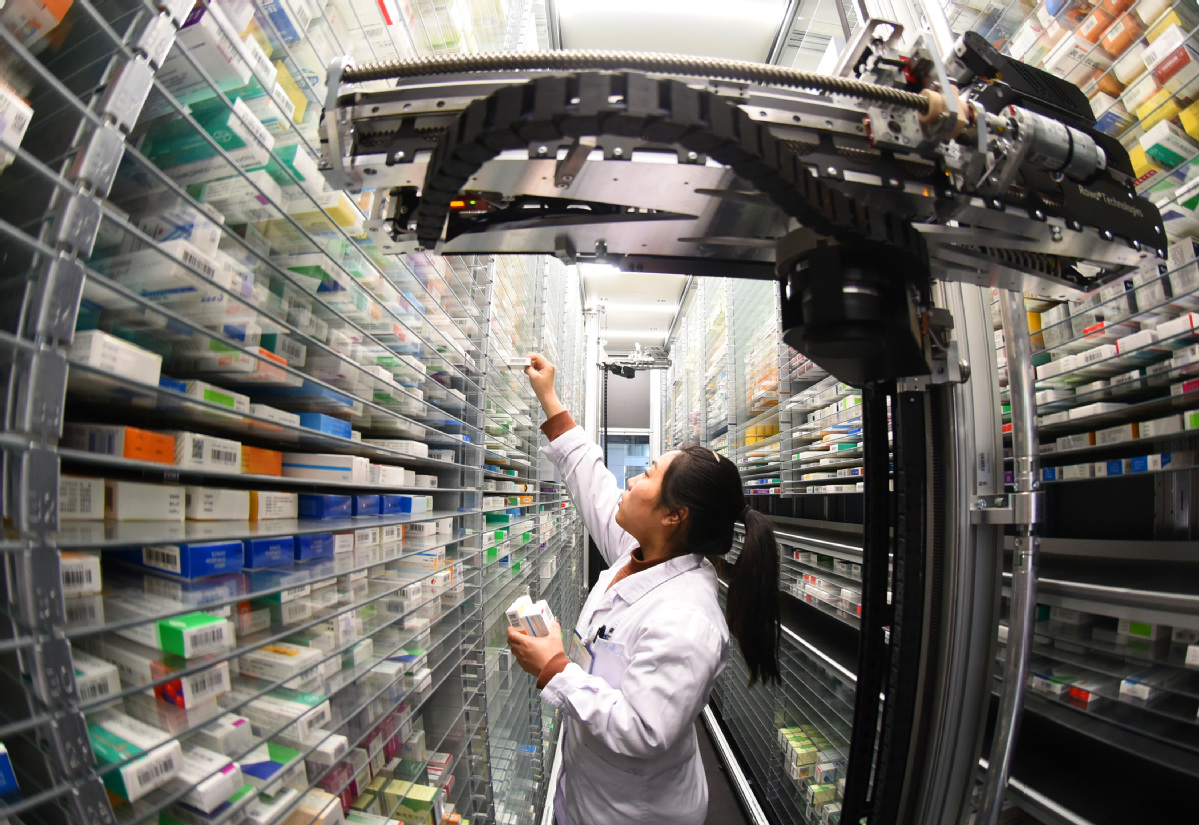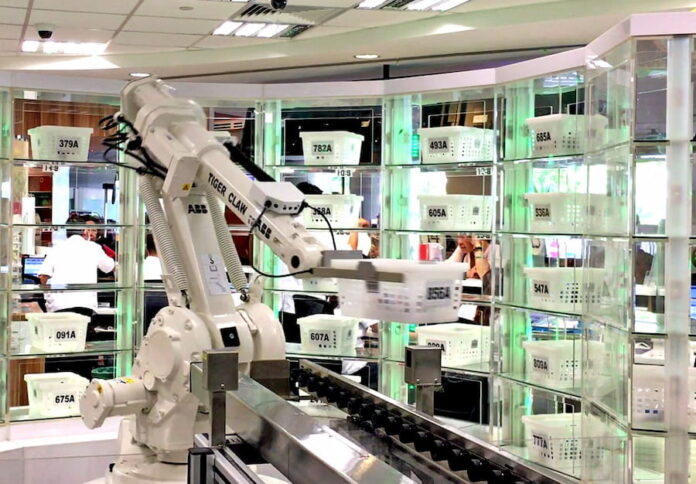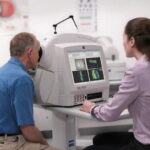This digital transformation has contributed to changing advanced pharmacy management systems based on big data technologies, artificial intelligence and cloud computing.
The smart pharmacy reflects the role of technology in dispensing medication without human intervention. The robot designed by companies specialized in automation programs dispenses a large number of prescriptions in record time via a special barcode for each box, and the medication is dispensed with the push of a button.
What is a Smart Pharmacy?
Smart pharmacies are pharmacies that use technology to improve the quality and safety of their services.
They use software to manage inventory, track prescriptions, and provide information to patients. They also use sensors and cameras to detect counterfeit drugs and theft.
Smart pharmacies are becoming increasingly popular because they can improve the accuracy and efficiency of pharmacy operations. Smart pharmacies may use a variety of technologies to improve the quality and safety of their services.
They may use software to manage inventory, track prescriptions, and provide information to patients. They may also use sensors and cameras to detect counterfeit drugs and theft.

How Does Smart Pharmacy Work?

Medications are dispensed in the smart pharmacy by a robot that picks up the medication and prints a label with patient and prescription information, then delivers it to the pharmacist’s window in a few seconds. The robotic pharmacy is also concerned with using advanced technological techniques through the design and operation of specialized software and the application of robots in pharmacies, as well as the computer systems necessary to manage them.
The robot works with great capabilities and high technologies without any possibility of error, and therefore the smart pharmacy is the solution to protect the patient from medication dispensing errors. Not only that, the automation of work in the pharmacy has contributed to enhancing the effectiveness of operations using barcodes and artificial intelligence, in identifying the drug package through its dimensions as a tool to reduce medical errors, in addition to designing control and follow-up points and integrating them into the system to ensure the quality and continuity of service, such as monitoring the validity of medicines, and alerting when Near expiry dates, monitoring drug availability and near-expiration alerts, automating inventory and inventory management.
The Responsibilities of Pharmacists in the Smart Pharmacy
However, the pharmacist’s role remains key in the smart pharmacy system. After the patient enters and gives the prescription to the pharmacist, he must answer the patient’s questions and inquiries in the meantime.
The order is given to the robotic arm to bring the prescribed medications, print the patient’s data and medical prescriptions, attach them to the box, and then send them to the pharmacist through a special tape. (barcode).
A pharmacist who is proficient in working on these advanced digital systems can administer medication using barcodes through electronic verification to ensure several things, namely the correct medication, the correct dose, the correct course, and the correct time.
The pharmacist verifies the data and implements the guarantees that check the patient’s barcode, thus making sure that any medication ordered is appropriate for the case being treated, that the dose is appropriate for the patient, and that the new drug does not interact negatively with any medications used by the patient.
Read Also
- Optimizing CT Protocols: The Hidden Key to Efficiency and Cost Savings in RadiologyIntroduction: Why CT Protocol Optimization Matters Computed Tomography (CT) is a cornerstone of modern diagnostic imaging, providing critical information across nearly every medical specialty. However, maximizing the value of CT — both clinically and financially — requires more than just… Read more: Optimizing CT Protocols: The Hidden Key to Efficiency and Cost Savings in Radiology
- The Role of Carbide Burs in Modern Dental ProceduresAs a result of this procedures need to be well coordinated and to this end, precision tools are used by dental practitioners. Among the most essential tools in a dentist’s arsenal are carbide burs, which have revolutionized various aspects of… Read more: The Role of Carbide Burs in Modern Dental Procedures
- Detection of Diabetic Retinopathy: The AI AdvantageDiabetic retinopathy (DR) is a leading cause of blindness among working-age adults, affecting millions worldwide. The prevalence of DR is alarmingly high, affecting an estimated 34.6 million people globally. In the United States alone, it is estimated that 7.7 million… Read more: Detection of Diabetic Retinopathy: The AI Advantage
- Advances in Digital Health: Transforming Modern HealthcareThe healthcare landscape is undergoing a seismic shift with the advent of digital health technologies. These innovations are not just modern conveniences; they are transformative tools that bridge gaps in accessibility, improve patient outcomes, and empower individuals to take charge… Read more: Advances in Digital Health: Transforming Modern Healthcare
- The Latest Advancements in Urology ProceduresUrology, the branch of medicine concerning the urinary system and male reproductive organs, has seen remarkable advancements in recent years. Technological innovations have led to more precise, less invasive, and increasingly successful procedures that promise better outcomes for patients. From… Read more: The Latest Advancements in Urology Procedures
Benefits of Using Smart Pharmacy Digital Solutions
The software solutions available today in the smart pharmacy assist the pharmacist in the effective distribution of medicines and enable him to control and manage the stock.
Among the most prominent facilities provided by advanced software solutions specialized in the automation of pharmaceutical work:
- Facilitate effective drug inventory management and tracking.
- Correctly matching prescriptions to medications and written dosage.
- Automation of data entry and processing.
- Reducing the error rate and providing effective patient care.
- Assist the pharmacist in formulating strategies to expand their business and improve patient care.
- Shortening time by dispensing a large number of prescriptions in record time, thus enhancing productivity.
- Improving the quality of patient care and ensuring their safety.
These integrated software solutions offer a set of features that make the work of the pharmacist more effective and efficient.
There are fewer errors related to dispensing the drug in terms of the recommended dose or quantity due to the defect in reading some prescriptions written in illegible font, but through this digital solution, there is accuracy in dispensing medication.
Moreover, since the patient file is in this system, the pharmacist is warned in the event that the prescription conflicts with another permanent treatment and informs them of the patient’s drug sensitivity, medical history, previous drug interactions, etc., which facilitates the administration of the drug and prevents harmful effects on the patient.
This system also allows the clinician to track the number of prescriptions for controlled medications received by patients, helping to reduce over-prescribing. It also enables a physician to identify potential drug abuse by monitoring the number of times a patient fills prescriptions for controlled substances. The doctor can also keep track of patients who have missed filling prescriptions and get them back on track.
Conclusion
In the coming years, pharmacies may become much smarter. New technologies are being developed that will allow pharmacists to more easily and accurately dispense medication. This could mean big changes for the pharmacy profession. Some experts believe that smart pharmacies will soon become the norm, and that pharmacists who don’t embrace new technologies will be left behind.
Smart pharmacies are different from other smart technologies because they are an integral part of the pharmacy.
Pharmacists will be able to perform a variety of tasks that were previously only available to technicians or managers. For example, smart pharmacies can track inventory, monitor patient satisfaction and provide medication reminders.






